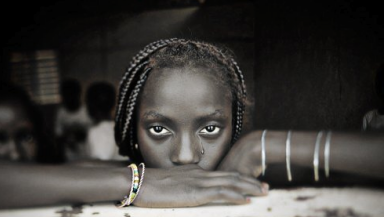
A new report by Human Rights Watch has painted a nightmare picture of the abuse suffered by victims of abduction at the hands of Boko Haram.
Human Rights Watch said in a 63-page report out on Monday that women and girls abducted by the Nigerian militants were forced to marry, convert, and endure physical and psychological abuse, as well as forced labour and rape while in captivity.
The report, "Those Terrible Weeks in Their Camp", draws on interviews with over 40 witnesses and victims of Boko Haram abductions in Borno, Yobe and Adamawa states.
They include some of the 276 girls snatched by the militants from a secondary school in Chibok in 2014.
"The Chibok tragedy and #Bring Back Our Girls campaign focused much-needed global attention to the horrific vulnerability of girls in northeastern Nigeria," said Daniel Bekele, Africa director at Human Rights Watch.
"Now the Nigerian government and its allies need to step up their efforts to put an end to these brutal abductions and provide for the medical, psychological, and social needs of the women and girls who have managed to escape."
Human Rights Watch said the group appeared to be targeting students and Christians in particular, with victims forced into converting to Islam by threats of whipping, beatings or death.
The organisation said the evidence pointed to a failure of the Nigerian authorities to protect women and girls from abuse at the hands of Boko Haram, and to provide with those who have escaped captivity with adequate medical and mental care.
The government was also criticised for failing to bring the perpetrators of the abductions and the abuse of the victims to justice.
It further warned that Boko Haram had been "emboldened" to abduct elsewhere because of the "relative ease" with which they had been able to take the Chibok schoolgirls.
Boko Haram translates roughly as "Western education is forbidden" and the group has also threatened to kill students for attending school.
The organisation raised concerns that funds set up by the Nigerian government for the 57 Chibok students who escaped Boko Haram have not benefitted the victims, saying the girls they spoke to were not aware of any government-supported mental health or medical care, and were afraid to talk about what they had suffered in captivity.
"The survivors of Boko Haram's violence should not be shamed and frightened into silence," Bekele said. "It is Boko Haram that should be ashamed of the abuses they commit against women and girls in their extreme interpretation of religious text."
HRW puts the number of civilians killed by Boko Haram since 2009 at 7,000. But the last year and a half has seen a spike in attacks and the organisation believes that at least 4,000 deaths occurred between May 2013 and September 2014.
There had been reports in recent weeks of a ceasefire being brokered with Boko Haram and the Chibok schoolgirls being released. However, HRW reports that the release of the schoolgirls is still being negotiated.
There are also concerns that troops are not equipped or numerous enough to take on Boko Haram militants, and that authorities are failing to act on the information being given to them by residents about past or possible future attacks.
"Abuses by Boko Haram and inadequate responses by the government are leaving many people in northern Nigeria beset by fear and anguish," Bekele said. "The government and its allies need to step up their protection, support services, and prosecutions of abuses on both sides to stop this cycle of terror."
Watch Human Rights Watch's account here:













